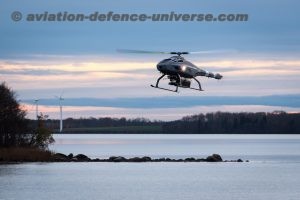
Singapore. 12 February 2020. Europe’s provider of Rotary Unmanned Aerial Vehicle (UAV) platforms, UMS SKELDAR, has partnered with the leading Swedish Aviation Technical Training School as part of its expanding training initiatives. In addition, UMS SKELDAR is working with the school to develop the highest quality UAV standards in a bid to pave the way for the impending regulations later in 2020.
Currently, the regulatory landscape for operating UAVs is limited with many organisations looking to the manned aviation standards for guidance. However, this is set to change with the European Union Aviation Safety Agency (EASA) currently developing regulations specifically for the UAV community in order to begin standardising working practices globally. As part of its work with the Aviation Technical Training School, UMS SKELDAR is at the leading edge of the technology innovations required to make this happen.
David Willems, VP Business Development and Strategy for the joint venture between Saab and UMS AERO GROUP, UMS SKELDAR, explains: “Over the last two years, we have experienced rapid growth both in Sweden and Switzerland. As a part of this expansion, we have developed a number of partnerships with institutions including the Aviation Technical Training School to not only bring in highly qualified talent, but also to help develop the regulations required to bring the unmanned sector up to the highest quality standards we all should live up to.”
The EASA has developed common European rules to apply the highest safety standards achieved in manned aviation, which it is applying to the UAV industry. The rules are based on an assessment of the risk of operation and strike a balance between the obligations of UAV manufacturers and operators in terms of safety, respect for privacy, the environment, protection against noise, and security. These new rules will cover each operation type from those not requiring prior permission, to those involving certified aircraft and operators, as well as minimum remote pilot training requirements.
Willems adds: “Our partnership with the Aviation Technical Training School is proving to add weight to what we are trying to achieve. It is critical we take on fully qualified staff members in areas of flight maintenance and avionics systems. As we continue to expand, we need people who are not only fully qualified in the operation of unmanned helicopters, but also those that can feed into the critical high-quality standards we always adhere to in this dynamic and fast-changing technology arena.”
At the Singapore Airshow, David Willems be discussing the work being completed to keep ahead of the regulatory landscape, he will also be presenting within the Singapore Aerospace Technology & Engineering Conference (SATEC) on Wednesday 12th February at 16:00 around the theme: VTOL (Vertical Take-Off and Landing) platforms in maritime operations – challenges and capabilities. The presentation will explore what scenarios organisations should expect to be able to undertake with a VTOL platform, and how they will play an increasingly important role in naval operations in the future.




























































































































